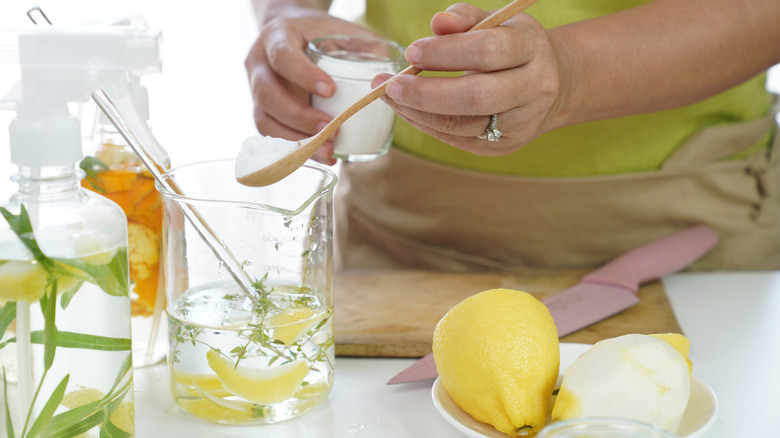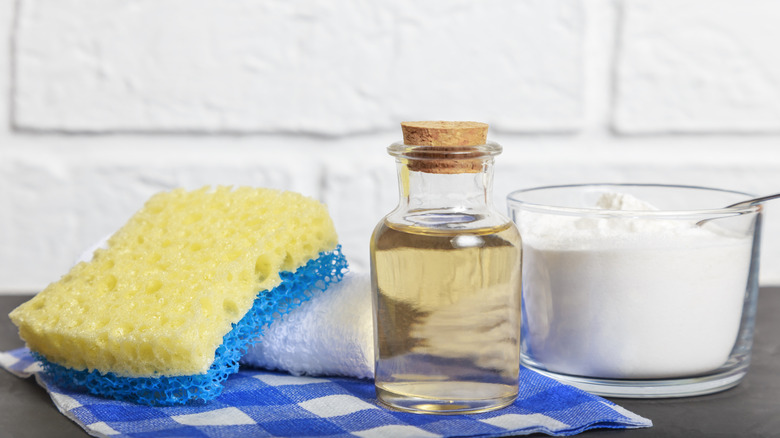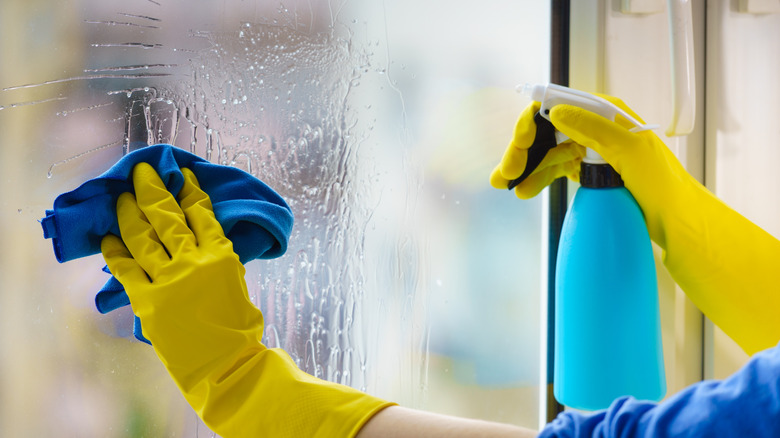Make A DIY Glass Cleaner That Never Leaves A Streak
When considering the high prices of cleaning essentials, many of us are asking ourselves whether buying commercial products like glass cleaners is essential at all. Instead of shelling out for that bottle of Windex, it is likely more budget-friendly to make your own cleaners, mixing go-to cleaning substitutes already in your pantry with water fresh from the tap. Homemade alternatives are also kinder to the environment and less irritating than stronger chemicals. For a DIY glass cleaner that won't leave streaks, all you need to do is mix water, white vinegar, and cornstarch.
Vinegar has a reputation for being a versatile cleaning tool, so it's no surprise that it works wonders on glass. Distilled white vinegar contains acetic acid, a compound that can banish the unsightly hard water deposits that collect on glass shower doors. Even though vinegar and water alone make a powerful cleaner for mirrors and windows, cornstarch is what you want to add to keep your glass streak-free because it's slightly abrasive and also absorbs moisture.
This combination will give you a base cleaner that keeps pesky streaks away, to which you can add rubbing alcohol, lemon juice, or dish detergent for tough cleaning jobs or to cut through greasy residues. Adding lemon juice to the cleaner can make it stronger because of its citric acid, which also tackles water stains and eats through the buildup hard water can cause. These additions accomplish some of what ammonia does in commercial glass cleaners but without the overwhelming fumes.
Mix vinegar, water, and cornstarch for glass-cleaning magic
Mix a ¼ cup of distilled vinegar with 2 cups of water to make the base for your DIY glass cleaner. To ensure the glass will be streak-free, mix in a tablespoon of cornstarch. And if spots on the glass are a concern, add a ½ teaspoon of liquid dish detergent or 2 tablespoons of lemon juice. Some recipes also call for adding a ¼ cup of rubbing alcohol to help cut through grease and prevent streaks.
The concentration of ingredients can be customized, so feel free to make smaller, larger, or more concentrated batches of the cleaner. If you're dealing with excessive grime, for example, you can use a 1-to-1 solution of white vinegar and water instead of a more diluted recipe. Once you've selected and measured out your ingredients, pour them into a lidded jar and shake well so they're distributed evenly before you add your homemade glass cleaner to a spray bottle. Extra unused cleaner can be stored in the jar for next time.
How to clean glass with homemade solution
Once made, set your cleaner to the side and dust the glass surfaces first; it will work most effectively if loose debris is removed. Spray the homemade cleaner onto the glass and wipe your window, shower door, or mirror with newspaper to get a good polish. Make sure to keep polishing until the window looks clear before leaving it to air dry, as it is important to wipe up all that grime-absorbing cornstarch. Alternatively, dampen a microfiber cloth in the solution and clean the glass with that instead if you don't have newspapers on hand. When using a mixture that contains dish soap, you'll want to have a clean sponge or cloth on hand so you can buff the spots out.
The weather and time of day you clean windows also matter in the battle against streaks. Avoid cleaning when it's very sunny, since this causes the cleaner to dry too fast, which may result in streaking. When cleaning both sides of a window, wipe opposite ways on either side of the glass – either horizontally or vertically. This way, you can easily identify which side any lingering streaks are on. No matter what, avoid circular motions that trap the water and leave marks.
This homemade glass cleaner can actually help you if you're moving on to cleaning other surfaces next. After cleaning a shower door, the vinegar, water, and cornstarch mixture will keep your bathroom sparkling clean, since it's also good for common sink and tile materials.


